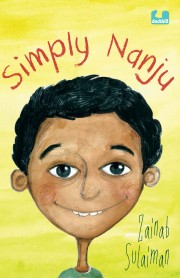Zainab Sulaiman, “Simply Nanju”
 Zainab Sulaiman’s book Simply Nanju is about a young differently-abled boy and his classmates. All of them have a bunch of challenges but have caring teachers and didis who tend to the children during school hours. This is a story with good diversity in the representation of communities albeit restricted to a narrow socio-economic class. Every single character’s story has been sensitively created by the author. A story about differently-abled children is an excellent idea given the paucity of literature in this area.
Zainab Sulaiman’s book Simply Nanju is about a young differently-abled boy and his classmates. All of them have a bunch of challenges but have caring teachers and didis who tend to the children during school hours. This is a story with good diversity in the representation of communities albeit restricted to a narrow socio-economic class. Every single character’s story has been sensitively created by the author. A story about differently-abled children is an excellent idea given the paucity of literature in this area.
It is also timely given the debates about the ‘Accessible India Campaign’ and the Central government having released the ‘Inclusiveness and Accessibility Index’ that measures the actions and attitudes of different organisations towards people with disabilities. ( HT Editorial, 6 April 2016, http://www.hindustantimes.com/editorials/government-must-remove-the-barriers-and-fast-track-the-disability-bill/story-0r7PDbg8ghLa54JlSEkykO.html )
The editorial continues to say:
The United Nations pegs the disabled in India at 15% of the population but the census of India fixes it at just 2.2%. This means there are many who do not get access to the State benefits that are due to them. One of the main reasons why the numbers are low is that the enumerators often don’t ask the right questions; families tend to hide those who suffer from mental illness; and sometimes they are unaware of challenges like autism. To redress this situation, the government needs to pump in more money on public awareness programmes and train enumerators better.
…
Last, but not the least, political parties must stop dillydallying on the passage of the Rights of Persons with Disabilities Bill, 2014, which is pending in Parliament. The Bill replaces the Persons with Disabilities (Equal Opportunities, Protection of Rights and Full Participation) Act, 1995. Instead of seven disabilities specified in the Act, the Bill covers 19 conditions. The Bill is being brought in to fulfil obligations under an international treaty. Many have criticised the Bill, saying that it’s not perfect — but then no Bill is. At least this has expanded the number of disabilities and that is a step forward and will give many more disabled people access to opportunities and funds that are earmarked for them.
There are sweet touches of incorporating lingo spouted by the kids such as “Shutyamouth!” and “Tensioning”. Children tend to experiment wildly and it is not easy to transfer it on to texts but Zainab Sulaiman has. As she tells Archit Taneja in a fabulous blog post on the Duckbill website “I did get some of the lingo from the kids I worked with at a school. It’s an interesting jumble of their mother tongue and what they learned at school. As teachers, we would try really hard to change this and make them speak “proper English”. However, I’ll admit that I cracked up every time they used them. I secretly wanted them to talk more like that! ” ( https://theduckbillblog.wordpress.com/2016/04/04/zainab-sulaiman-interviewed-by-archit-taneja/ )
The story is a gentle whodunnit story of trying to discover who is the culprit responsible for stealing notebooks in class. Unfortunately this story is a flat and standard narrative of children’s literature, not very nuanced and far too noisy relying on many conversations to propel the plot forward. Also the premise of the book relying only on children of financially challenged backgrounds with stereotypical characteristics of domestic violence, child abuse, alcoholics etc is a little difficult to digest. It would have been preferable if the book focused on differently-abled children and brought out the challenges by creating a landscape that would resonate with readers of all age-groups and social standing. Despite every good intention and experience of the author working as a special educator this book will only further alienate such children. Young middle class readers ( who are presumably the prime target group) will read it as pure fiction and move on little realising that such individuals exist around them too. If the purpose of literature is to help sensitise grave issues such as disabled children Simply Nanju is a book that falls far short of expectations. Yet sell it will. Probably even get adopted as supplementary texts in schools since there is little or no literature on the subject. It will make an excellent conversation starter encouraging debates in schools.
All said and done it is a book that must be read.
Zainab Sulaiman Simply Nanju Duckbill Books, Chennai, 2016. Pb. pp. 122. Rs. 199
